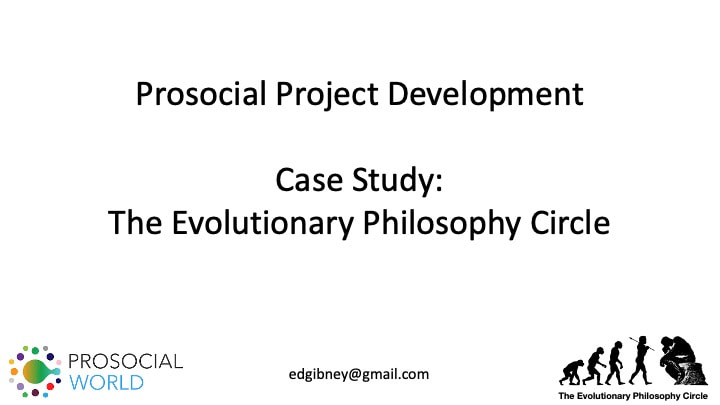As I announced back in March, I was invited to create a new group of philosophers to go through this process, and be part of what David Sloan Wilson has called "a bold new experiment in cultural evolution." Well, we're over halfway through that experiment now, which means we've completed our first run through the Prosocial process and I thought I should report on how it is going.
Eleven different groups have formed on the Prosocial Commons platform and are currently making their way through all this. Recently, I was asked to present to everyone what our philosophy group has done, in order to provide a kind of "case study" for what has gone well or poorly, and what can be shared, discarded, or improved upon. My presentation was given during one of the weekly "Cafe" meetings that provide an opportunity to share general information and ask questions that any group can learn from. The 27-minute recording of my talk can be seen below, and it was described as follows:
The Prosocial process leads groups to understand: 1) the Core Design Principles for successful groups; 2) the ACT matrix for psychological flexibility; and 3) goal setting for focused action. In the first generation of activities on the Prosocial Commons platform, groups were given 4 weeks to get through this process using just a handful of tools. In this video, the case study of how this went for the Evolutionary Philosophy Circle is presented by co-leader of that group Ed Gibney. This presentation was given during a general Prosocial Cafe meeting on Friday May 20, 2022.
After sharing the details of all that management work, I also gave a few thoughts on how I tried to drive engagement throughout the whole process. I had to do that engagement work because it turns out that this experiment is probably a lot like a gym membership. It sounds great. Maybe your best self *wants* to do it. But it's still really hard to change habits and begin doing something new that's a bit difficult. Although people all self-selected to volunteer to go through this, and they all had to donate some money to join in, and they were asked up front to promise 2 hours of work per week on these projects, a majority of participants across the site have not lived up to that.
But that's okay! Enough people have joined in. And the people that have made it through have been almost universally spectacular to meet and work with. The Prosocial process has unearthed deeply held values and fears that it turns out we all share. And that has provided an opportunity to form strong, purposeful bonds even though we've only just met, and we are only meeting impersonally via Zoom and online chats. The tools and instructions have, quite frankly, been both lacking and overwhelming at times. We've all lost valuable members at each new hurdle. But in general there is a real feeling of excitement and enthusiasm at doing something new, which excuses many of the bumps in the road because we all know the intention is to continuously improve things using the tried and true evolutionary method of variation, selection, and retention. In a few generations, successful steps will be surviving and thriving.
Having been through this just one time now, I can already see how much easier we can make this for future groups. And the power these groups can have is only limited by their imagination. Think about the good intentions of every group you have ever worked with, and how most of them have failed because of one typical problem with group dynamics or another. Now imagine a way to get rid of all those self-destruct buttons that kept you from realising your goals. It doesn't mean the work to change the world will be easy. But it does mean it will be much clearer to manage.
Having the Prosocial process in hand, and developing all the tools to use it, feels like the start of something really big. It was specifically designed to start small, and radiate out, group-by-collaborative-group, until it spreads success throughout populations across the globe. That was the theory. And I can see it now in practice.
If you have a group (or even just an idea for a group!) that you'd like to experience this process with, don't hesitate to ask me how you can do so. It's open to anyone, and it will only get easier.


